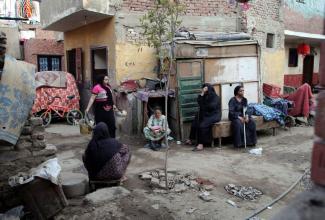Habitat III
Urbanisation as opportunity

Megacities with a population of more than 10 million, such as Mumbai, Dhaka and Shanghai, will account for a comparatively small part of the anticipated increase. Small and medium-size cities with less than 1 million people will grow fastest. 90 % of urban growth is expected to happen in emerging markets and developing countries, especially in Asia and Africa.
In context of rapid and uncontrolled urbanisation, poverty and inequality become increasingly urban. In the course of the next generation, one in three people will live in an informal settlement without access to affordable and adequate accommodation or being able to earn a wage that allows a decent living. Life in slums means dramatic deficits in terms of infrastructure and social protection. Educational and employment opportunities are poor, and so is health care. Furthermore, most slum-dwellers cannot afford transport. Especially the youth lack opportunities, are excluded from urban life and have no development prospects.
If urbanisation continues at the present rate, it will be necessary to construct as much urban infrastructure in the next 35 years as was built since people started living in towns and cities (see interview with Dirk Messner). Urbanisation is complex and multidimensional, and unless it is sustainable, it will not offer chances to reduce poverty, make efficient use of resources, promote social inclusion and improve the quality of life for all urban dwellers.
Many policymakers and other stakeholders call for a paradigm shift with a greater focus on the problems of urban growth. They want the criteria for sustainable development to become more firmly entrenched, but even that is not enough. A radical change of perspective is required:
- Cities and their populations must not be regarded as “recipients”, “target groups” or “places for intervention”. They need to be perceived as responsible actors of development and empowered to play that role.
- Necessary investment needs sound financing, so cities must get access to funding from national and international markets.
- Sufficient and sustainable supply alone is not enough: equal access for all is also essential.
The Habitat III Conference is scheduled for October in Ecuador’s capital Quito. It will matter in the sense of establishing and enforcing principles of this kind. Its mission is to adopt a “New Urban Agenda”, setting out a global urbanisation strategy for the next 20 years in line with Agenda 2030’s Sustainable Development Goals (see D+C/E+Z e-Paper 2016/07, p. 8).
Germany is involved in preparing Habitat III and is working to create a practical and verifiable global agenda. This should include:
- maximum municipal self-government with strong local capacities and reliable funding,
- holistic and efficient solutions for use of scarce resources,
- the creation of parks, social centres, cultural facilities et cetera to improve quality of life for residents and
- stronger international exchange to facilitate mutual learning and exchange of experience.
One of the core responsibilities of any municipal authority is to guarantee the provision of public infrastructure and services. Affordable, sustainable urban mobility is essential. It is vital for ensuring that every member of the urban community can reach vital facilities and (job and housing) markets from their home and can participate in economic and cultural life. It also increases energy efficiency, promotes environmental protection, helps mitigate the effects of climate change and helps reduce health risks. Cities are becoming increasingly attractive for people and investors; economies grow and society develops.
For this reason, Germany specifically supports partner cities in the area of urban infrastructure development and will introduce delegates in Quito to a transformative urban mobility initiative. It is designed to support innovative mobility projects and help bring about the necessary switch to greener transport worldwide (see box).
Franz-B. Marré heads Division 312 “Water; urban development; mobility” of the Federal Ministry for Economic Cooperation and Development (BMZ).
franz.marre@bmz.bund.de
Maria-Theres Haase is a researcher at Deutsches Institut für Entwicklungspolitik/German Development Institute (DIE) and an adviser to BMZ Division 312.
maria-theres.haase@die-gdi.de
Link
BMZ, Urban Development:
http://www.bmz.de/en/what_we_do/issues/stadtentwicklung/











